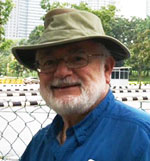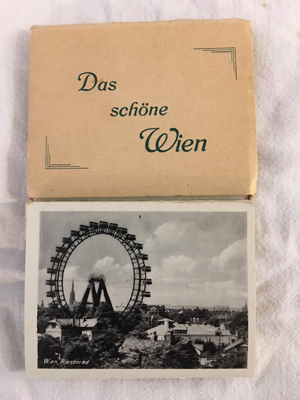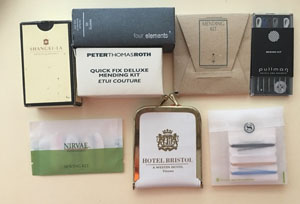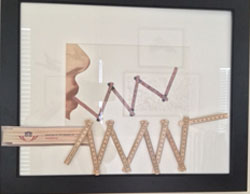By Oliver Pollak

RICHMOND, California — Two weeks in Germany, the Czech Republic, and Austria netted hardly any souvenirs. And not for want of opportunity. The Jewish gift shops in Cologne, Prague, and Vienna were well stocked. But we travel as light as we can, going and returning. Most souvenirs have a short half-life. Will you still love it tomorrow? In Israel in 2014 we purchased soap and lotions from a Druze cooperative. Many urban scenes and meal memories are captured on the iPhone.
My earliest souvenirs were acquired in a London recovering from World War II and food rationing. I have a silver commemorative coin from the Summer 1951 Festival of Britain, a 1952 London tram ticket from the closing of the almost 100-year-old infrastructure, and menus and memorabilia from our November 1952 Atlantic crossing to America on the Liberté. I was 8 years old. These treasures filled my life with wonder, inspiration, and vocation. My parents had travel souvenirs. Mother lived in Germany until 1939 and saved postcards. The cards did not go with her to England in her small emigrant suitcase. Mother was a life-long postcard sender. My father’s “Das schöne Wien” 1930s vintage strip of 19 black and white 3¾ x 3 inch views survived. My wife Karen’s parents liked small oil paintings from Tzfat.
My parents had travel souvenirs. Mother lived in Germany until 1939 and saved postcards. The cards did not go with her to England in her small emigrant suitcase. Mother was a life-long postcard sender. My father’s “Das schöne Wien” 1930s vintage strip of 19 black and white 3¾ x 3 inch views survived. My wife Karen’s parents liked small oil paintings from Tzfat.
My mother collected decorative china tiles and pottery plates, especially from Mexico and Spain. She placed them on the wall. Many souvenirs are meant as gifts for people who stayed at home. A postcard might read – “Dear grandchild, maybe someday you will visit this place.” My mother encouraged us to travel, and we learned well.
During our effusive period we filled the house with art and memory cues from living in England and Southern Africa, European travel. and military service in Southeast Asia. Decades later, concern for wall space, who will want this when we’re gone, and reading books on acquisition and disposal, we are more cautious about loading our suitcases.
Photographs and slides taken with cameras using film filled drawers, and albums. The digital camera and the ubiquitous selfie has made preserving images as natural as staying hydrated.

Free is good. Hotel amenities — Mechanical pencils, conventional pencils, and ball point pens emblazoned with logos, note pads, shoe shine mitts, slippers, sewing kits, fading matchbooks, and other blandishments abound. Toiletries – hand lotion, body lotion, shampoo, and conditioner – went to our synagogue and then to homeless shelters. No ashtrays, robes or towels.
Dining produces menus, paper napkins, sugar packets, and at the cashier counter little booklets containing toothpicks.

The sole souvenir, other than postcards, acquired on our two-week family roots trip was this folding ruler from Vienna publicizing the Austrian parliament’s renovation, a bargain at €3.60 It’s cute and virtually useless but complements “Measure your words” by Omaha graphic artist Hannah Segura. Lashon hara (evil tongue) is a caution against gossip.
Parents, aunts, and grandparents of an earlier generation assiduously were sent postcards with messages from distant exotic locations, from Israel to the Grand Canyon. Postcards in Vienna in 2018 were €0.50, with postage €1.80. We decided to mail them from the States, which we did not. We have not inherited the inveterate postcard sending gene. We text with photos. We will hand the Vienna Lipizzaner horses cards directly to the grandchildren.
Trying to figure out what a child will like is baffling — games, bracelets, necklaces, and foreign coins. A pull string Pinocchio in Lucca, a joy for young and old, was a must buy. With our remaining Chinese renminbi we purchased a wooden panda pencil box, colored pencils, and 3D popup puzzles.
Regional emblematic handicraft clay, wood, paper, metal, and brush are in bountiful supply. We go for local coffee and tea. Airport duty-free stores provide alcohol – local liquor, single malt scotch, tequila because they did not have mescal, and French wine. No more T shirts or expansive coffee table books. I guess we lean to consumables.
You ambitiously take books to read on the plane and purchase more enroute. We create imaginary unending reading lists. In the 20th century we bought pamphlets and leaflets on Notre Dame, Sacre Coeur, Chartres, Stonehenge, Salisbury, Winchester and Chichester Cathedral.
In one of Prague’s synagogue bookstores I purchased The Prague Cemetery by Umberto Eco, and had the shop clerk inscribe it in Czech. Sixty pages into a book filled with vitriolic anti-Semitism, leading I suspect to the creation of “The Protocols of the Elders of Zion,” I quit and left the next 300 pages unread. Eco is an accomplished author of 22 novels of which I have read four and 1/7th. I’m looking forward to a review copy of Marriage of Convenience based on the Vienna’s Museum Judenplatz’s exhibit on marriage to foreigners in 1938 to escape Austria.
Ephemera, art gallery, museum and music tickets, entertainment programs, some signed by performers, brochures, pamphlets, and maps, diaries, and receipts reveal how we filled days and evenings.
This mélange is displayed on walls, shelves, glass rolling étagère, or hidden in closet and garage file folders and boxes marked “travel, trip, vacation.” Souvenirs inspire us to remember. Knick knacks, bric a brac and our memories need occasional dusting. I loved that place, the food, the sights, I could live there, I hope to revisit. Souvenirs record idiosyncratic collecting and reading habits.
Since 2014 we have visited Israel, and 17 other countries and acquired soap, Shan coffee, Buddhist texts, lacquer bowls, pearls, tea, silk bedding, scarves, tequila, a folding ruler, and an interest in ethical tourism, purchasing from the disabled. Call it “Tikun olam.”
*
Pollak, a professor emeritus of history at the University of Nebraska Omaha, and a lawyer, is a freelance writer now based in Richmond, California. He may be contacted via oliver.pollak@sdjewishworld.com